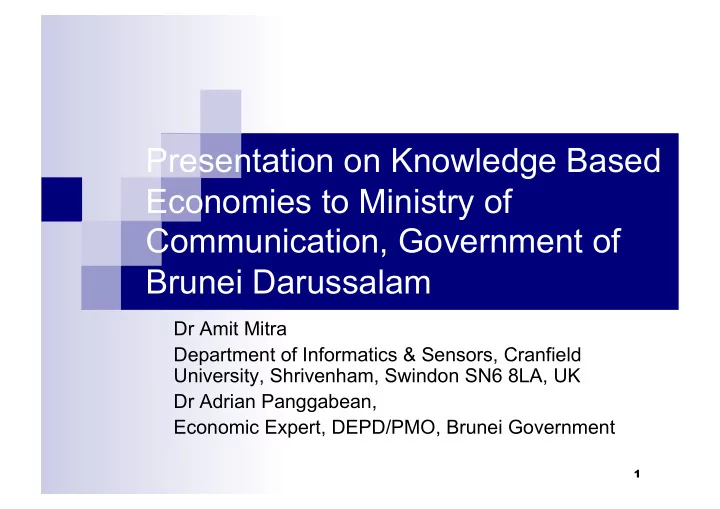

Presentation on Knowledge Based Economies to Ministry of Communication, Government of Brunei Darussalam Dr Amit Mitra Department of Informatics & Sensors, Cranfield University, Shrivenham, Swindon SN6 8LA, UK Dr Adrian Panggabean, Economic Expert, DEPD/PMO, Brunei Government 1
Knowledge connotations Capacity for effective action – Karl Erik Sveiby Justified belief that increases an entity’s capacity for effective action – Ikujiro Nonaka Knowledge is information that changes something or somebody – either by becoming grounds for action, or by making individual (or an institution) capable of different or more effective action – Peter Drucker 2
What is KBE?/ Why KBE? Definitions The use of knowledge technologies (such as knowledge engineering & knowledge management) to produce economic benefits (Wikipedia) Economies that are directly based on the production, distribution and use of knowledge and information (OECD) Formulations and definitions of KBE vary. The appropriate KBE model will differ from one country to another. It is therefore, more accurate to refer to KBE models or a KBE model than to talk about the KBE model (ADB) 3
Significance of the knowledge economy Growth and trade of countries and societies are no longer primarily dependent on manufacturing The exponential influence of the internet today is persuading businesses/organisations to have an internet presence This is leading businesses/organisations to re-examine what is being offered from two perspectives, i.e., know why and know how Units, institutions and in the end societies therefore are beginning to re-evaluate and alter what they are able to offer 4
Accepted contributors to knowledge based economic growth Economic and institutional regime Education Innovation ICT 5
Exemplar of issues & questions discussed among workshop participants on KBE pillar development for Brunei Education/Training/Learning Systems Whether the governance and management of the education system is efficient for quality improvements and cost effectiveness To what extent do results of initiatives to provide better information and statistics on school inputs and performance inform possible new reform initiatives in education? How to increase the number of graduates of Brunei with tertiary education degrees? Can foreign branch campuses be encouraged within Brunei? Will the cost per student be sustainable? Responsiveness of education system to societal trends such as skill development of the Brunei labour market Are we providing the right subsidy/facility to encourage equal access to education? Do we have the right mix of skills that can promote KBE? What about the policy/incentives to promote “adult education”? Is the schooling system pitched at the right level in a way to promote KBE? 6
Exemplar of issues & questions discussed among workshop participants on KBE pillar development for Brunei National ICT strategy Which elements of the national ICT strategy and action plan have been implemented so far? What is the budget and time schedule for the strategy plan? What are the experiences gained with e-government initiatives so far? What specific initiatives have been taken to increase the ICT literacy skills of the population of Brunei? Are there data on ICT literacy skills of the Brunei population? Can new legislation introducing increased competition in the telecommunication market be developed to benefit consumers and small businesses? Has Brunei developed laws and regulatory frameworks to promote e-commerce activities? Are there specific initiatives to stimulate companies in Brunei to explore business opportunities using the internet? Alignment of, and coordination between, any ICT strategy that exists. What are the potential benefits or costs of the existing governance structure of ICT development in Brunei? 7
Workshop outcomes We are able to understand our capacity to act, to demonstrate value, to be able to relate to value in current activities undertaken by public sector We have come up with a range of recommendations on the four pillars of KBE. Key civil servants have been sensitised through exposure to other country experiences on challenges of KBE 8
The way ahead Serious round of discussions involving key decision makers should take place to filter and agree on a set of priority, realistic, targets for each pillar of KBE for Brunei Darussalam. Further examinations of non-energy options have to be considered seriously. Involvement of SMEs to develop a business infrastructure that can sustain the knowledge based potential of Brunei Darussalam. Further considerations of the priorities of the four pillars of KBE are likely lead to the creation of a master plan that will define the effectiveness of this KBE strategy. 9
Recommend
More recommend